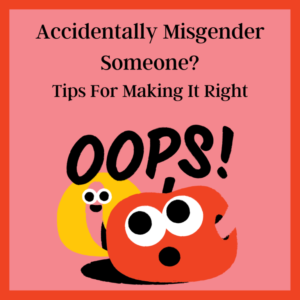
Accidentally Misgendering, and How To Make It Right
Hello Friends!
The other day, I saw a friend get accidentally misgendered on a social media site. My friend corrected the person who then spent three or four good sized paragraphs apologizing, explaining themselves and asking questions. I was tempted to post to tell the person that I didn’t think that this was a good way to handle being corrected but I decided not to do so. My observation of the exchange doesn’t account for the fact that there may have been details I wasn’t aware of. So I stayed quiet there, but decided to blog about the topic.
Misgendering is intentionally or unintentionally referring to a person in a way that does not align with their affirmed gender. Most often this refers to using incorrect pronouns for a person. It can also refer to using language that doesn’t align with the affirmed gender of a person. (For example calling a person or people “dude”, “girl”, or “guys”) This is done both intentionally by people and unintentionally. I’ve been doing this type of work for years, and I still struggle with this on occasion. I have accidentally used a wrong pronoun before. But what I’m most guilty of, and am still working on today, is referring to a group of people as “guys.” My intention certainly is not to misgender anyone, but the impact of my words is more important than the intention. We all make mistakes, so what do we do when we mess up?
In this case with my friend, to my outside observation, the person definitely misgendered my friend unintentionally. They were very sorry, wanted additional clarification, and offered explanations. Sounds good, right? Well, not so much. It’s great the the person was sorry and wanted to fix things. But I think there were several ways this person could have responded better to my friend. I think a better response would be something more like, “oh sorry, thanks for reminding me, I’ll get it right next time.” The end.
Let’s look at the two different responses. In response one, the person spent a lot of time apologizing. In the second response, the apology was short and concise. In the first response, the person explains themselves whereas in the second response the person just apologizes. In the first response, the person then asks a bunch of additional questions. In the second response, the person asserts how they will do better in the future.
In the first response, the person who did the misgendering is potentially asking for the person they misgendered to do additional emotional labor. It is exhausting to correct and educate people over and over. It’s exhausting to have to spend time making someone feel better after they are overly apologetic. Asking additional questions on social media puts the person in a position to potentially have to spend time and energy they don’t want to spend to answer. This is one of the reasons why some people opt not to correct people misgendering them some of the time. That’s not a choice people should have to make.
In my example, the person who’s done the misgendering apologizes, thanks the person for correcting them, and states they will get it right next time. This puts no additional burden on the person who’s been misgendered. IF the person still had questions after apologizing, a better idea might be to contact them privately and ask if they have the spoons and energy to answer questions. This lets the person consent to taking the time if they wish, and also lets them know that you respect their time and emotional labor.
TLDR? If you misgender someone accidentally – apologize briefly, thank them, and assert you will do better. The end.
My pronouns are she/her/hers.
Until next time friends!
Love,
Kat

